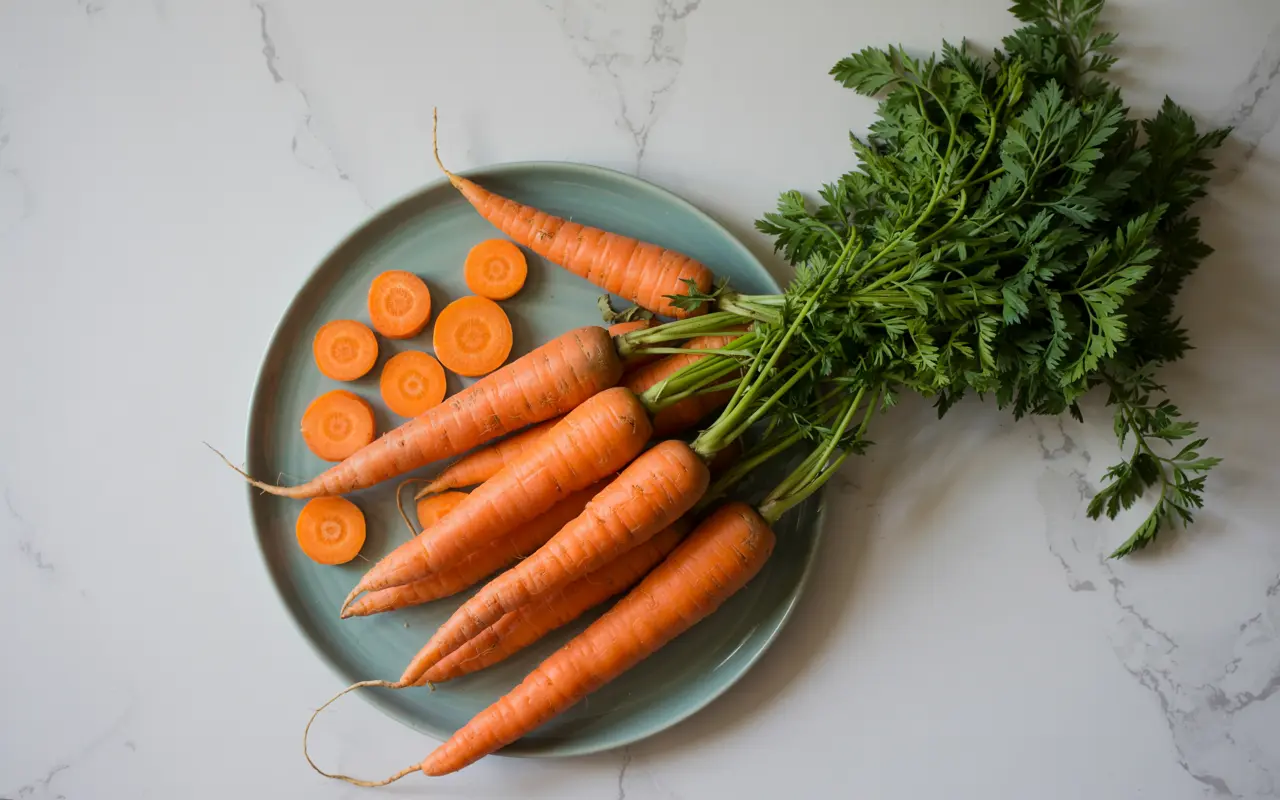Benefits of carrots reach far beyond a crunchy snack. Packed with beta carotene, fiber, and essential vitamins, they support vision, heart health, and digestion while staying low in calories. Raw or cooked, carrots are simple to use every day and deliver reliable nutrition with minimal effort.
Table of Contents
Podcast with Chef: Health Benefits of Carrots
Mia invites Chef from ZurbanRecipe to uncover how carrots boost your eyes, heart, and skin, plus smart ways to make them taste incredible every day.
Bright, Crunchy, and Full of Goodness
The Benefits of carrots begin with color, crunch, and easy everyday use. This simple vegetable adds flavor, texture, and steady nutrition to meals without extra effort.
Flavor and Texture You Notice in Every Bite
Fresh carrots bring a clean sweetness and crisp snap. Roasting concentrates that sweetness. Light sauté gives tender edges. Puréeing turns them silky for soups and smoothies.
Everyday Ways to Use Carrots, Raw or Cooked
- Snack sticks with hummus or yogurt dip
- Shaved ribbons in salads and wraps
- Roasted with olive oil, salt, and pepper
- Grated into oatmeal, pancakes, or muffins
- Blended with orange or ginger for a bright smoothie
Nutrition That Works for Real Life
Benefits of carrots include practical nutrition you can count on. Beta carotene supports vision. Fiber helps digestion and fullness. Potassium supports healthy blood pressure. All in a low-calorie bite.
Quick Pairings That Make Carrots Shine
Ginger and garlic for warmth. Lemon or orange for brightness. Cumin or coriander for depth. A small splash of olive oil to help absorb vitamin A.
What’s Inside a Carrot?
The Benefits of carrots come from a powerful mix of vitamins, minerals, and antioxidants that support your eyes, heart, and immune system. Despite their natural sweetness, carrots stay low in calories while offering impressive nutrition in every bite.
From Beta-Carotene to Vitamin A
Carrots are famous for their high beta-carotene content, a powerful antioxidant that the body converts into vitamin A. This nutrient is essential for maintaining healthy vision, immune function, and cell growth. Like sweet potatoes, carrots are naturally rich in this compound, giving them their vibrant orange color and powerful antioxidant effects.
Eating just one medium carrot can supply over 200% of your daily recommended intake of vitamin A.
These benefits are supported by research, including a scientific review published by the National Institutes of Health, which highlights the antioxidant and anti-inflammatory properties of compounds found in carrots.
Key Nutrients That Boost the Benefits of Carrots
Beyond vitamin A, carrots provide a full range of nutrients your body needs for energy, strength, and protection:
- Vitamin K1 helps with blood clotting and bone health
- Vitamin C strengthens immunity and collagen production
- Vitamin B6 supports energy metabolism
- Potassium balances fluid levels and blood pressure
- Fiber aids digestion and keeps you satisfied
- Lutein and Zeaxanthin protect your eyes from light damage
All this nutrition comes in a low-calorie package of about 25 to 30 calories per medium carrot.
According to Medical News Today, carrots also contain key nutrients like vitamin A, vitamin C, B vitamins, and fiber, all of which contribute to digestive health, immune function, and blood sugar balance.
Why the Benefits of Carrots Go Beyond Vision
The Benefits of carrots begin with eye support, yet the Benefits of carrots also include heart health, digestion, immunity, skin balance, and steady energy. With beta carotene, fiber, potassium, and antioxidants, the Benefits of carrots reach far beyond a simple crunchy snack.
Eye health is the starting point
The Benefits of carrots for vision come from beta carotene converting to vitamin A for night vision and surface protection. Lutein and zeaxanthin help filter light and maintain long term clarity.
Heart health and circulation support
The Benefits of carrots include soluble fiber that can help lower LDL, potassium that supports healthy blood pressure, and antioxidants that calm oxidative stress affecting arteries.
Digestion and gut balance
Carrots are well known for their fiber content, which helps regulate digestion and support a balanced microbiome. Their blend of soluble and insoluble fiber promotes regularity and reduces bloating. When paired with other fiber-rich vegetables like broccoli, the benefits are even greater for gut health and inflammation control.
Immunity and skin recovery
The Benefits of carrots extend to immune strength and skin repair. Vitamin A supports normal cell turnover, vitamin C aids collagen formation, and antioxidants help neutralize everyday stressors.
Blood sugar steadiness and weight goals
The Benefits of carrots include a low glycemic index. Fiber slows absorption, supports fullness, and helps manage cravings when you swap refined sides for roasted carrots.
Brain and healthy aging support
The Benefits of carrots may aid healthy aging. Carotenoids and polyphenols help fight oxidative damage that can affect memory and focus.
Daily targets and easy wins
To capture the Benefits of carrots, aim for one to two cups per day across meals. Pair with olive oil or yogurt to improve vitamin A absorption. Use raw sticks, quick roasts, or soups to keep it simple.
How to Add Carrots for More Benefits
Use simple habits to unlock the Benefits of carrots every day. Mix raw crunch and cooked comfort so you get steady nutrition with minimal effort.

Quick raw ideas you will actually use
- Snack sticks with hummus or yogurt dip
- Shaved ribbons in salads and grain bowls
- Matchsticks in wraps and sandwiches for extra crunch
Cozy cooked ideas for busy nights
- Roasted carrots with olive oil, salt, and pepper
- Steamed coins with lemon and parsley
- Light sauté with garlic to serve beside chicken or fish
Blend, bake, and sweet uses
- Smoothies with orange, mango, or ginger
- Grated into oatmeal, pancakes, or muffins for natural sweetness
- Puréed into creamy soups for body and color
Pairings that boost absorption
To capture more Benefits of carrots, add healthy fat so your body absorbs vitamin A better. Use olive oil, avocado, nuts, or a spoon of yogurt with your carrot dishes.
Simple daily targets
Aim for one to two cups across the day. These small choices compound the Benefits of carrots without extra effort.
From crunchy snacks to cozy dishes carrots show up for every craving.
💡 Pro tip: Pair carrots with a source of healthy fat, like olive oil or avocado, to maximize beta-carotene absorption and get the most Benefits of carrots.
What People Get Wrong About the Benefits of Carrots
Even with all the Benefits of carrots, a few misunderstandings still circulate. Let’s clear them up so you can enjoy carrots with confidence and real knowledge.
Do carrots cause high blood sugar
Carrots taste sweet, but the Benefits of carrots include a low glycemic index, meaning they do not cause sudden spikes in blood sugar. One cup of chopped carrots has about six grams of natural sugar plus fiber that slows absorption. They fit easily into a balanced diet, even for people managing blood sugar levels.
Are cooked carrots less healthy
No. Cooking actually enhances the Benefits of carrots by increasing beta-carotene absorption. While some vitamin C is lost with heat, your body gains more access to key antioxidants. The best approach is to enjoy both raw and cooked carrots for a full range of nutrients.
Do baby carrots have fewer nutrients
Baby carrots share the same Benefits of carrots as whole ones. They are simply trimmed for convenience. Keep them in cold water and store them sealed to preserve their moisture and crisp texture.
Can carrots really improve eyesight
Yes, but the effect comes with consistency, not overnight. The Benefits of carrots for vision come from beta-carotene converting to vitamin A, which helps prevent night blindness and supports long-term eye health.
Are carrot greens safe to eat
Yes. Carrot tops are edible and full of antioxidants and chlorophyll. They have a slightly bitter flavor but blend well into pesto, soups, or herb mixes for an extra nutrient boost.
Chef Recommends
Simple ideas that help you feel the Benefits of carrots in everyday meals.
Quick wins for busy days
- Carrot and ginger soup, creamy and warming
- Roasted carrots with olive oil, salt, and pepper
- Skillet carrots with garlic beside chicken or fish
Meal prep you will actually use
- Carrot and chickpea salad with lemon and parsley
- Shredded carrot slaw with yogurt and dill
- Carrot oat muffins for a grab and go snack
Sweet ideas with balance
- Carrot smoothie with orange and a slice of ginger
- Baked carrot coins with cinnamon and a drizzle of honey
- Whole wheat carrot pancakes with walnuts
Flavor pairings that amplify the Benefits of carrots
Ginger and garlic for warmth. Lemon or orange for brightness. Cumin or coriander for depth. A spoon of yogurt, nuts, avocado, or olive oil to improve vitamin A absorption.
💡 Chef Tip:
Roast carrots at 425°F for 20 to 25 minutes with olive oil and a pinch of salt, then finish with lemon zest and a splash of juice for bright flavor and better vitamin A absorption.
Top 4 FAQs
Are carrots high in sugar
No. Carrots have a low glycemic index. One cup of chopped carrots has about six grams of natural sugar plus fiber that slows absorption.
Do carrots really improve eyesight
Yes. Beta carotene converts to vitamin A that supports night vision and long term eye health. Results come with regular intake, not overnight.
How many carrots should I eat per day
Aim for one to two cups across the day, mixed raw and cooked, to capture the full Benefits of carrots.
Are cooked carrots less healthy than raw
No. Cooking increases beta carotene availability. Combine raw for crunch and cooked for better absorption.
Final Thoughts: Simple, Sweet, and Powerful
The Benefits of carrots go far beyond crunch. This everyday vegetable supports eyes, heart, skin, and digestion with steady, simple nutrition. Affordable and versatile, carrots fit any routine, raw or cooked, and bring color and balance to your plate.
What’s your carrot hack
Do you grate them into pancakes, blend them into smoothies, or roast them until caramelized
Share your favorite way to use carrots in the kitchen, and let the Benefits of carrots inspire your next meal.

